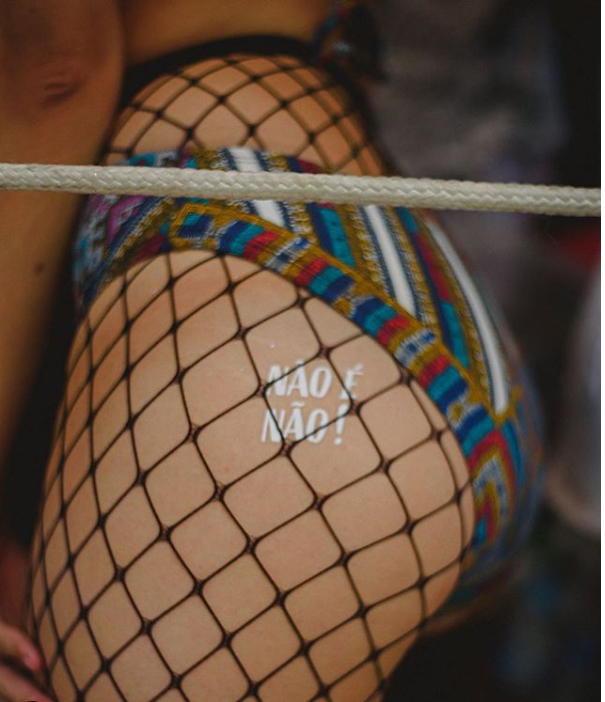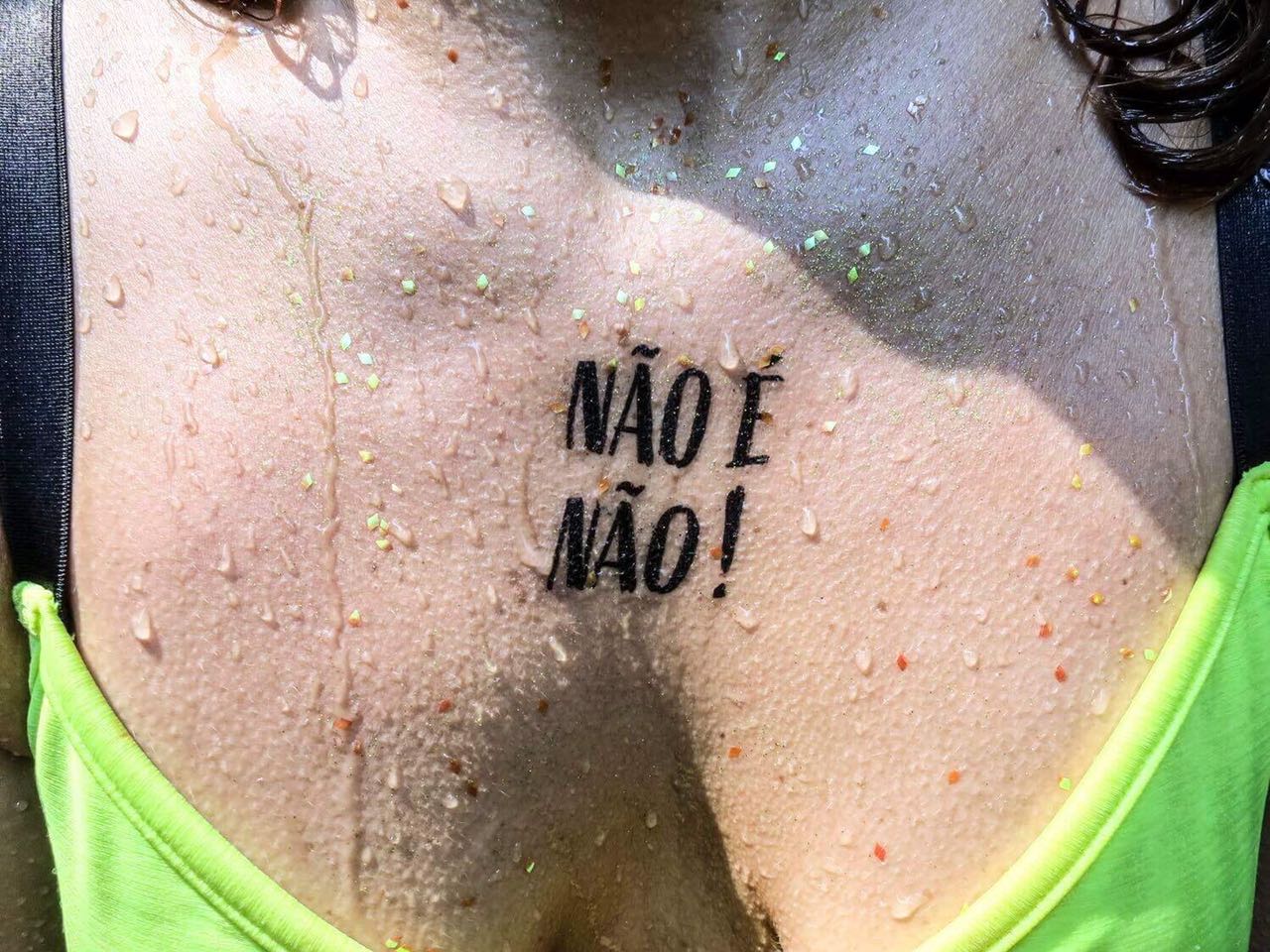“Não é Não!” returns to the streets this carnival to fight harassment against women
Temporary tattoos invite people to reflect on respect for the female body during the holidays


Carnival in Brazil is a time of great joy, dancing and celebration. During this period, however, the number of men who feel free to touch women without consent increases considerably. This behavior constitutes the crime of sexual harassment. To spread awareness about women rights and inhibit violent attitudes among men, a group of women decided to get together and take to the streets the scream of order Não é Não!
Julia Parucker, one of the NN coordinators, says that the movement emerged spontaneously during the pre-carnival in Rio de Janeiro, in 2017. “A friend was at a samba party and, when approached by a man, said three times that she didn’t want any approach. Even so, he pulled her by her shorts closer to him. What else did she need to do to have her will respected?! That’s when the idea of writing não é não on one’s own body came up”, recalls Julia.
Inspired by movements to support women victims of harassment #metoo and #meuprimeiroassedio, the friends got together and created a crowdfunding to make temporary tattoos and distribute them among women in street blocks and other events throughout the carnival period.

Sorority
The tattoos were a success. “We realized that there was a great need for women to take a stand against this type of harassment. And it was impressive because it showed how violence against women is normalized by society”, says Julia.
Faced with the importance that tattoos had achieved, this group of women organized themselves again to occupy the main carnivals in Brazil the following year. In 2018, kits were sent to several cities, including São Paulo, Salvador, Olinda and Recife. Everything was done through the collective, with campaigns on the internet and personal contacts. A wide network of female solidarity had formed.
Jéssica Alencar used the tattoo at the carnival in Olinda and says it was a remarkable experience. “When she had the tattoo, other girls greeted her, stopped to ask where she had gotten it, talked about how important the idea of Não é Não! There were incredible exchanges of support, one of the greatest feelings of sisterhood I have ever received”, recalls Jessica. For her, these initiatives are important because they give women the chance to be seen with an active voice. “Our right to speak was tattooed on our bodies!”, says Jessica.


In 2019, NN was already present in all regions of Brazil, reaching many cities in the interior. “The tattoo was powerful because it carried a political sense of leaving the need to assert the woman’s will in the skin itself”, explains Julia.
How NN works
Maintaining the initial momentum, this group from Rio de Janeiro set up a strategy for women ambassadors to be responsible for organizing local crowdfunding. Entrepreneurial women were included in this network to provide financing rewards and an exclusive channel was created on the Benfeitoria website, in order to concentrate all campaigns in the same place. In 2020 alone, 17 collective financings were made, an expressive amount that indicated the size of the campaign across the country.
During the pandemic, NN decided to stay at home in respect of the sanitary measures implemented, but not without carrying out awareness campaigns on women’s rights. During this period, domestic violence skyrocketed. In addition, many people decided to ignore the isolation recommendations and started to attend parties and bars. NN began to welcome women victims of violence and started to make and distribute posters where it was possible to read the guidelines on how to act in these cases through QR code.
For Julia Paruker, it is necessary to act on several fronts to combat violence against women. “We know that a tattoo alone will not solve the problem, but it opens the way for awareness, for the debate on respect for the body, especially at times like Carnival”, she says.
“We live in a patriarchal society where the desire of the man is more important than the consent of the woman. And to transform this we need to act on several fronts. The first is with prevention, talking about it, empowering women so that they have the courage to say no when they don’t want to. Show men that the woman’s will should indeed be respected. There is also the issue of reception. It is necessary to know how to welcome the victims. Finally, the punishment. The legislation acts mainly in this sense”, explains Julia.
Schools in transformation and partnerships with companies
To expand the actions, NN was also in public and private schools in Rio de Janeiro, Minas Gerais and Piauí, giving lectures and workshops on women’s rights for youth. In 2021, the group decided to formalize the initiative. The tattoo design began to be printed on t-shirts and caps, which are sold at Endossa stores, in Rio de Janeiro and Brasília, and at Loja Vives, which delivers nationwide.
The sale of these products finances the project’s activities in schools, called Schools in Transformation. NN also partners with other companies, always focusing on combating harassment. Currently, three women are at the helm of NN: Julia Parucker, Aisha Jacob and Barbara Menchise. For this carnival, thousands of tattoos were distributed among partner blocks. Autonomous movements should also happen across the country.
The proposal of the Não é Não seal in entertainment and recreation spaces
The third edition of the report “Visível e Invisível: a vitimização de mulheres no Brasil”, carried out in 2021 by the Fórum Brasileiro de Segurança Pública e Datafolha, shows that one in four Brazilian women over the age of 16 has suffered some type of violence, which which represents a universe of approximately 17 million women victims of physical, psychological or sexual violence in Brazil.
After the Daniel Alves case, arrested in Spain in January 2023 on charges of rape, several bills were filed in Brazil to protect victims of sexual violence in national establishments. Federal deputy Dandara Tonantzin (PT/MG) filed a bill (PL nº 4/2023) that creates the seal ‘Não é Não’, a security protocol to curb and mitigate cases of sexual violence against women. Proposals in this sense were also presented by the deputies Maria do Rosário (PT-RS), Maria Arraes (Solidariedade-PE), Sâmia Bomfim (Psol-SP) and Fernanda Melchionna (Psol-RS) – both together – and by the deputy Duarte Junior (PSB-MA). All bills are based on the No Callem protocol from Barcelona, Spain.
WANT TO SUPPORT THIS CAUSE?
Follow Não é Não:
https://www.facebook.com/tatuagensnaoenao/



